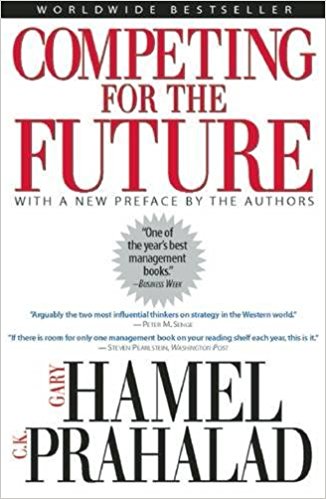You've heard of Market Share, what about about Opportunity Share?
TL;DR
Traditional strategy focuses on analyzing the current markets and how win within them; however, current markets are far less valuable than future markets. Companies need to consider their ability to capture future opportunities, the opportunity share, rather than competing for existing market share.

I stared reading a book this week called Competing for the Future by C.K. Prahalad and Gary Hamel. My strategy professor recommended it to me and said:
“The book contains bits of profoundly obvious knowledge that would revolutionize companies if they just applied it.”
After I heard that, I thought I had found the holy grail of business strategy. Fast forward four weeks of waiting for the snail mail to deliver my $.01 book with $3.99 of shipping and the book arrived.
I drudged through a few pages of the bland intro and finally skipped to the first chapter. Once I read a few pages of the first chapter, I realized I really stumbled upon the secret garden of business strategy.
“The wealth of a firm, and of each nation in which it operates, largely depends on its role in creating tomorrow’s markets and its ability to capture a disproportionate share of associated revenues and profits.”
(Competing for the Future by Gary Hamel & C.K Prahalad)

I’ll use a convenient list of steps the authors give to sum up the ideas. Winning out on future opportunities consists of:
- Competition for industry foresight and intellectual leadership
- Competition to foreshorten migration paths
- Competition for market position and market share
Competition for industry foresight and intellectual leadership:
Companies should compete to have the best understanding of the future. Not only what it looks like, but also how customer will use products in the future. It's "competition to image the future."
Competition to foreshorten migration paths:
The authors say it best, it's essentially “competition to actively shape the emergence of future industry structures to one’s own advantage.” This stage is about bringing the whole industry to a new area. Whoever can execute and bring a product to market fastest will win this phase.
Competition for market position and market share:
This is the focus of nearly 99% of all strategy books and also where most companies fixate their attention. However, as you can see, it's only a third of the entire process. In this process, companies should remember that focusing on the final stage of market-based competition, without an understanding of how the market arrived where it is today, is meaningless.
Put your sights on the future everyone!

That’s it for this time, I hope you learned something and please feel free to share your thoughts below. Do you agree with these authors? Do you have experience applying this knowledge or can you apply it in the future? Let me know!
Interesting! Looking forward to the next bit.
Just found you due to the Dlive transperany post announcing the official team. Wanted to follow and connect as I really appreciate Dlive services and what it does for the Steem Blockchain I am so committed to!
Thanks, Full Steem Ahead!
Congratulations @jneb802! You have completed some achievement on Steemit and have been rewarded with new badge(s) :
Click on any badge to view your own Board of Honor on SteemitBoard.
For more information about SteemitBoard, click here
If you no longer want to receive notifications, reply to this comment with the word
STOP